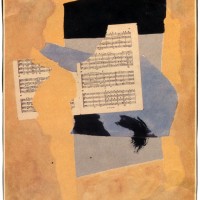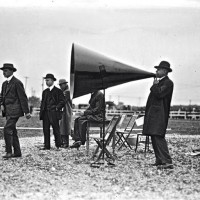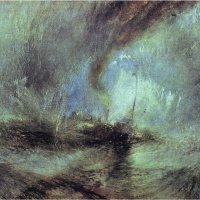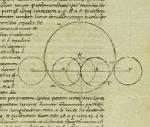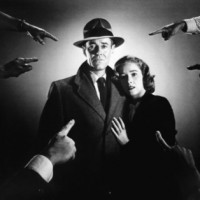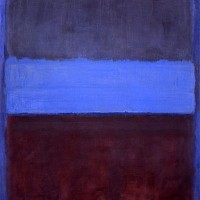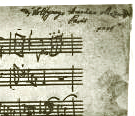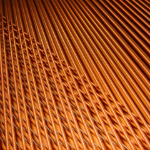Patterns of rising and falling inflection are vital to a lot of music. Purely instrumental music often encodes emphasis-patterns that resemble speech, or song. (Linguists prefer the term "intonation" to signify these rises and falls.) In the notation of European classical music, at least since the 18th century, musicians have used "slurs" as a means of indicating phrase groupings and stress patterns. Describing two notes written under a slur, … [Read more...]
Misprision
In performing Billy Strayhorn's "Lush Life," some singers deliver the subtle, and possibly difficult to pronounce word combination "distingué traces" as "distant gay traces." A British lawyer or Harold Bloom might call this a "misprision." We may willfully twist a text to achieve a particular meaning. Or perhaps we are always getting it wrong. Bloom writes definitively: "Every poem is the misreading of a parent poem... There are no … [Read more...]
Amplify
During October, I gave four performances in France (Paris, Lyon, Orléans, Paris) in clubs or alternative, non-classical venues. For each of these shows, the piano was amplified (some engineers prefer the term "reinforced"). Mics were positioned fairly close to the strings of the piano, the sound processed, and piped through a PA system. In one instance, the resulting sound heard by the audience was louder than what the acoustic piano could … [Read more...]
Keel
Marian Seldes observed that one of the great problems of being an actor was accepting, or coming to terms with the inevitable rejection in auditioning for roles each year. Along with artistic capacity -- we can add to the list of necessary attributes for a performer some means for handling disappointment. It's curious balance. We seek persons of delicate sensitivity and perception; they also need to withstand the turbulence of other … [Read more...]
Correction
As I started working on Morton Feldman's For Christian Wolff, I aimed to learn the notated rhythms accurately. The published score is a reproduction of Feldman's handwriting. Some things puzzled me. There are a few measures that don't add up to the expected number of beats (mistakes?). (The top staff is the flute part. The lower staff is the keyboard part: notes with stems up, played by the keyboardist's right hand on the piano, notes with … [Read more...]
Circuitry
We truly learn so much by reading music performance treatises; yet we make a mistake if we read them too simply. Many useful keyboard how-to-books grow from Enlightenment sensibilities: treatises penned by the keyboardists C. P. E. Bach, Daniel Gottlob Türk, Carl Czerny, Ignaz Moscheles. I'm not suggesting that these authors were practicing "esoteric writing" -- the deliberate making of paradoxes and puzzles of meaning. I'm suggesting that … [Read more...]
Ensemble
Nantes, 2015 It's the last week of January, and I'm in France for the yearly mega-festival La Folle Journée. During 5 days, 330 concerts are being presented! (I play 5.) Folle Journée is the work of many people -- especially René Martin, founder and artistic director of Folle Journée. Recently, talking with Tim Page, I realized just what significant influences the ideas of a few concert presenters, a few producers (and critics) have been on … [Read more...]
Thoughts while playing Knee Play 4
It can happen, in the laboratory of the concert -- you notice things, discovery occurs. Suddenly, sometimes surprisingly, associations are made, even in music long-practiced. During the summer in France, I performed my solo piano transcription of "Knee Play 4" from Philip Glass's Einstein on the Beach. And, in an auxiliary channel of thought -- aside from the monitoring of my playing, aside from giving the performance -- I made … [Read more...]
Mistaken Identity
In a solo recital at the Wigmore Hall, I gave the London premiere of Entranced by Mark-Anthony Turnage. It's a fantastic piano piece, rooted in American gospel music by way of Duke Ellington. I spoke with Sally Groves at Schott Music in advance. Mark was traveling back to London on the day of my concert. He would arrive in plenty of time to hear his piece. The concert went well. Though I didn't play Mark's piece quite as well as I wished, it … [Read more...]
Doctor Doctor
I'm a Doctor of Musical Arts, but I seldom say so. In music schools like the New England Conservatory where I teach, the degree-ed-ness of the faculty is in inverse proportion to age. The older the faculty member, the less likely they are to have advanced degrees. Some older pianists earned advanced degrees in other fields. Charles Rosen had a Ph.D. in French literature... The Latin word "doctor" comes from "docēre" -- "to teach." I don't wish … [Read more...]
Poesie
During a presentation by James Parakilas concerning examples of ambiguous musical notation, I noticed something. Parakilas was discussing the metrical organization in Fauré's tenth barcarolle. A curious hovering syncopation pervades the music. Fauré: Tenth Barcarolle A detail of piano writing in measure 7 corresponds, in my opinion, to the practice of singing an audible final syllable for a French word like "rose." Normally spoken as one … [Read more...]
Remodeling
In the cadenzas Beethoven wrote for his C-Major Piano Concerto, opus 15, higher high-notes are utilized than those in the concerto itself. The cadenzas were written down around 1809, more than a decade after the concerto. When you add on a new room to your house you may use the same materials as the original construction, but whether using the same materials or not, you're likely to utilize current technology in doing the construction. … [Read more...]
4 Trombones
Paris, 2014 Arnold Schoenberg gave Rudolf Serkin an assignment. (This story is hearsay; worthy of attention, in my opinion.) Consider the opening of Mozart's A-Minor piano sonata, Schoenberg asked Serkin. What is the right instrumentation for this music, if it were to be scored for orchestral instruments? Mozart: Sonata in A Minor, KV 310 (300d) Serkin's answer included an oboe playing the upper melody line, and strings taking the … [Read more...]
Moving Target
I don't know how to play the violin. In a master class in France, a violin prodigy played rather brilliantly for me -- while standing on one foot. "Try the beginning again, and be sure to keep both of your feet on the floor," I suggested. With string instruments, I notice that when the position of the fingerboard is not fairly stable spatially, playing is more difficult. It makes sense. The left hand finding pitches, and the bow contacting the … [Read more...]
Ugly Beauty
"The first question I ask myself when something doesn't seem to be beautiful is why do I think it's not beautiful. And very shortly you discover that there is no reason." -- attributed to John Cage The sound coming from pianos (the physical, real sound) may displease the pianist. In trying out a concert piano, there are often several notes on the instrument that just can't be made to produce what is wanted. Those notes may need "voicing" -- a … [Read more...]


